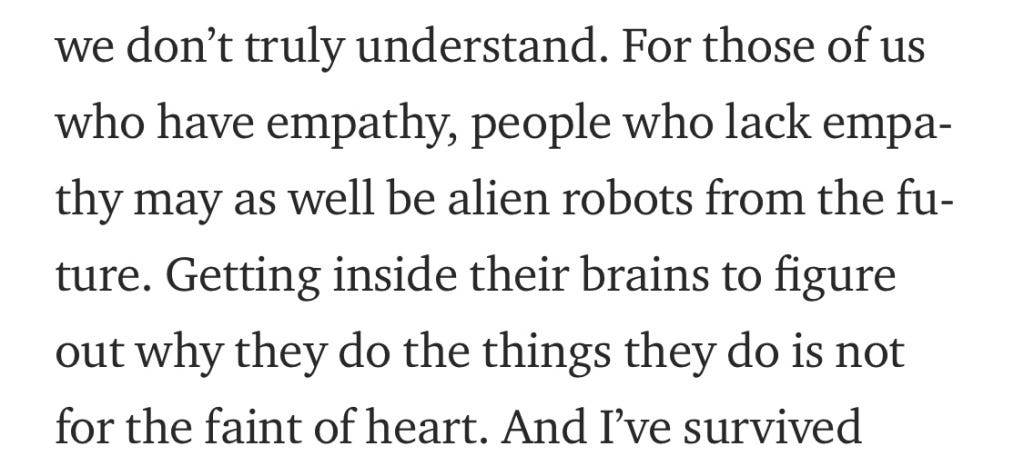Lately, I’ve been tying attitude polarization to various aspects of mental health problems. You’ve probably seen my post about polarization in schizophrenia, so now I’m out here telling you that this is also an aspect of cluster B personality behaviors, including narcissism and psychopathy.
First, here is something I was writing in my class about polarization:
Research indicates that confirmation bias arises from the human tendency to engage in motivated reasoning to reduce cognitive dissonance. Scientists have suggested that giving people motivation, either rewarding or aversive, induces motivated reasoning, which has distinct mechanisms that are separate from either cold reasoning or emotional regulation (Taber & Lodge 2006). When we are rewarded for believing in some idea, we are given a motivation to confirm this belief. In contrast, when the belief in an idea is aversive, this provides us with a motivation to reject the belief.
Similarly, dissonance theory suggests that when ideas that contradict our position are presented, we experience dissonance, which is, in essence, an aversive experience (Harmon-Jones & Mills 2019). The research suggests that during cognitive dissonance, people seek to reduce the stressful contradiction that they are faced with, which often involves changing beliefs or becoming biased to confirm the desirable belief. This suggests that cognitive dissonance provides an incentive for motivated reasoning by providing an aversion to holding contradictory beliefs.
Other research has found that prior attitudes remain ingrained even when presented contradicting evidence (Westen et al 2006). In this study by Westen et al, when subjects were presented with information that contradicted their position, they proceeded to engage in confirmation bias, presumably due to the stress of the contradiction they faced, as dissonance theory would suggest.
Polarization is essentially the dynamic in which people are faced with the cognitive dissonance that arises because of the different beliefs each person holds. You could imagine that this occurs in people on the political left and right, with people who are religious or atheist, and so on. This cognitive dissonance pressures people to reject their opposition, which eventually further ingrains both sides in their own position.
So how does this tie together with cluster B?
Narcissism
One of the cluster B behavior sets is what we commonly refer to as narcissism. I suspect most of you already know about narcissism, but in brief, people who are narcissistic often are seen as arrogant, selfish, manipulative, charming, and unempathetic. In the past, I’ve argued that the behaviors underlying narcissistic traits are actually normal. Specifically, these are behaviors one is likely to engage in when they are threatened by other people. As an example, if someone calls you stupid, you are likely to lose empathy for that person and maybe even your patience. You might want to call them stupid back, which is quite arrogant if you did so.
What makes narcissism different than this circumstantial situation I’ve just outlined, is that people labeled narcissistic have likely been chronically involved in such circumstances or even traumatized by them. For example, if one was abused and told that they are stupid, they may become insecure about their intelligence in the long-term. This may lead the person to brag about their intelligence or try to prove to others that they are smart. They may also use the strategy of belittling other people’s intelligence when they feel threatened. In some sense, narcissism can be viewed as a kind of PTSD that is specific to rejection. A kind of post-rejection stress disorder. There may be other pathways to the narcissism behavior, but this is likely a popular one.
So how does polarization relate?
One of the largest personality correlates with narcissism is low agreeability which is also sometimes referred to as antagonism (Weiss & Miller 2018). In essence, disagreeability. Remember, disagreement is basically the initiation step for cognitive dissonance. When someone disagrees with us on something that matters a lot, we may find explanations for why this is the case. If we suspect our position to be solid and intelligent (which we often do, because we would not have strong convictions with ideas that we, ourselves, deemed as stupid), then we might assume the opposition is not intelligent enough to have concluded the same way that we have. This clearly occurs in political polarization, where both sides view each other as basically insane. So in some sense, disagreement provokes cognitive dissonance, which may result in polarization and even dehumanizing of the opposition. Both sides of the political fence are narcissistic towards each other.
Here is an example of narcissistic polarization that even has a tragic sense of irony:
This person is dehumanizing other people and acting superior and abusive while also claiming their opposition is narcissistic. It is clear that they are narcissistic themselves, and moreover, this is polarization on a topic that many know to be commonly polarizing.
As for the narcissist personality, they may be polarized in relation to many or even most people. They may hold views with strong convictions while viewing disagreers as being unable to form intelligent views. This would apply not only to viewpoints but also to decisions and behaviors.
There is a catch though.
We often dehumanize the narcissist. We often do not empathize with the narcissist. If we understood the narcissist, then none of these points I’m making should be new to you, but instead, you should feel like you already knew all of this. Consider this example taken from a website talking about narcissists:
The issue here is almost shocking. This person is describing their inability to comprehend or empathize with the perspective of the narcissist while self-proclaiming to have empathy. It is almost paradoxical.
Due to the way we polarize from disagreement, the one who holds convictions for which society disagrees on commonly will face chronic rejection. We even instruct people to reject narcissists as the solution to the problem. That said, I am not suggesting that you let yourself become abused by a broken person that is trapped in such feedback loops. There may be a way to convert people who have spent long periods of time in those feedback loops, perhaps with psychedelics and seeding insight into the person.
These feedback loops appear to associate with various cultures of rejection. For example, the vegans are often rejected and also described as being on “high horses”, which is really another way of describing narcissism. Conspiracy theorists are commonly rejected and they often describe other people as “sheeple” which is pretty narcissistic as well. On the other hand, we often label conspiracy theorists fools, which is narcissistic of us to do too. And, as observed in the screencap above, vegans get a lot of narcissistic hate themselves. The pattern is quite reciprocal, which we will explore more further.
Let’s move onto the next cluster B problem, psychopathy.
Psychopathy
Another cluster B set of behaviors is what is commonly referred to as antisocial personality. It is also commonly called sociopathy or psychopathy. Some try to make distinctions between those two, but I am not yet totally convinced. I am sure some psychopaths were created more by environmental factors while others may be more genetically predetermined, at least to a larger degree than others. If you are unfamiliar, psychopathy is basically a person who engages in antisocial behavior such as violence, cruelty, abuse, or taboo behaviors that are against the cultural rules, oftentimes with no remorse.
I’d argue that most people are like this, under certain conditions. If someone murdered your best friend, you will likely not act prosocially to the murderer. You will likely not feel empathy. You will wish to engage in psychopathic behavior towards the monster. You will want them dead, harmed, and you will want to behave antisocially in all kinds of ways. In fact, we imprison antisocial people in cages, which could be viewed as a kind of torture. If you imprison your neighbor’s son in your basement for 10 years, you’d certainly be viewed as a psychopath. But what if you imprisoned a criminal in your basement for 10 years? Many will empathize with this because it seems fair.
This is what it comes to; fairness is about reciprocation. Prosocial and antisocial behavior are reciprocal at their cores. We wish to be antisocial to antisocial people, while we are prosocial to prosocial people. We want people to get what they deserve.
There can exist feedback loops that create the state of psychopathy for a person. Imagine that you are a young school child and the only social experience you’ve had, is with an abusive father. What you’ve learned about humans is that they are potentially unsafe and scary. You have very little data on human behavior outside of this situation with your father, simply because you are young and naive. When you enter elementary school, you will lack certain skills that other children with prosocial parents have developed. You will be naive and guarded. It would seem irrational to expect that strangers are nicer than everyone you’ve ever met (your abusive father being presumably the only person, or at least for this thought experiment). Due to this, the guarded behavior of the child will lead other children to respond. Being guarded is potentially antisocial, something that the other children won’t like, especially if you react defensively or hostile. This may prompt the other children to avoid or reject the abused child.
The abused child will see a society that is antisocial, rejecting, and avoidant/neglecting. This may prompt the child to be upset. Particularly if the other children are all groupish with each other, leaving out the abused child. The hurt child may then ingrain further into antisocial tendencies. As time passes, and as the child develops (or fails to), he will learn that humans are cruel, unempathetic, and he will not learn to trust or bond with people. Meanwhile, the healthy child will learn to progress their skills in human connection. The psychopath child may end up learning to do this as well, but there may be this undertone that human bonding is fake, that people are inherently cruel and dark, and are simply responding to the manipulative behaviors of the psychopath, rather than being truly good.
So what about polarization?
As stated before, political oppositions appear to have very little empathy for each other in the current state of American politics. In essence, both sides are antisocial towards each other.
On some level, this is really the core of xenophobic behaviors. Ingroup favoritism and outgroup derogation. Those who do not conform to the culture bubble one lives in is breaking the rules or social norms, thus they are antisocial and might deserve outgroup derogation for their heresy. The fear of persecution drives us closer together, superficially, under the guise of shared beliefs and convictions in the norms that we are policed to obey. The psychopathic personality is the person who decides to resist these norms and rules in various ways, sometimes in very dark ways, as is the case for murder. Outgroup derogation is the aversive motivator that drives people to polarize. It drives ingroups to favoritize and pushes for outgroup derogation.
Now consider the case of political war. War may be one of the most polarized states possible. Not only do both sides become psychopathic relative to each other, but they also become full-fledged serial killers. In the case of the lone psychopath, this kind of individual may be at war with society.
Depolarization
In order to depolarize people, there are a few steps.
Reduce cognitive dissonance for other people. We are conditioned to react defensively when we percieve resistance from other people. Resistance often leads to more radical behaviors, sometimes even violence or verbal abuse. Sometimes it is just a fear of rejection and exile. So we tend to have a conditioned threat response that is activated by disagreements.
Consider the case of flat earth theory, where most people abuse followers of this framework. We mock them. It is even socially acceptable to be cruel to the followers of the flat earth theory. This only serves to polarize both sides. I’ve even noticed that there is a risk for me to be open with flat earth thinkers, as if my mere association to the person is dangerous, regardless that I am not at risk for believing such ideas.Control other people’s behavior via reciprocation strategies. Behave in the ways you wish the “opponent” to behave. Our actions are contagious. Control your behaviors and try to build a reciprocal, positive interaction. You can control the narrative, so avoid the ones that involve a war against the other individual. Perhaps the individual should not even be an “opponent” at all.
Learn how to disagree with people. Most of us have a seemingly innate tendency to take the polarization path, otherwise we probably wouldn’t be discussing such a phenomena right now. Keep this in mind constantly. If you pay attention, you can notice that every interaction and conflict involves such polarizing dynamics. If you pay attention to this constantly, you can phrase yourself properly and control the tone of your voice in such a way that other people let their own guard down.
Let your own guard down. This is a reciprocal problem. You drive other people to become defensive because you are defensive. You might not always start the pattern, but once someone attacks or expresses conflict, you probably sink right into these patterns as most people do.
Take other people’s ideas seriously if you want them to take yours seriously. People sometimes learn how to fake this one. I see people politely strawman their opposition as if to express they understand. No. You must actually respect their idea and try to discuss it if you wish to get through to them. Both parties must let be vulnerable.
Avoid punishing or rewarding beliefs if you wish to have a conversation devoid of motivated reasoning.
If you pushback on the belief, consider yourself a facilitator of that belief system. Going back to the flat earth theory, this belief is a highly stigmatized one. They have become so ingrained in this belief because of the pushback from the rest of the world. Since we know that this stigma facilitates the polarization process and motivates resistance in the flat earthers, it can be said that people who express this stigma are promoting flat earth theory and its’ persistance. This is your fault.
Lastly, spread awareness of these psychological processes. Teach other people how this works. It may help create a better world.
If you disagree, please polarize yourself in the comments below!
Citations
Harmon-Jones, E., & Mills, J. (2019). An introduction to cognitive dissonance theory and an overview of current perspectives on the theory.
Taber, C. S., & Lodge, M. (2006). Motivated skepticism in the evaluation of political beliefs. American journal of political science.
Weiss, B., & Miller, J. D. (2018). Distinguishing between grandiose narcissism, vulnerable narcissism, and narcissistic personality disorder. In Handbook of trait narcissism (pp. 3-13). Springer, Cham.
Westen, D., Blagov, P. S., Harenski, K., Kilts, C., & Hamann, S. (2006). Neural bases of motivated reasoning: An fMRI study of emotional constraints on partisan political judgment in the 2004 US presidential election. Journal of cognitive neuroscience.



